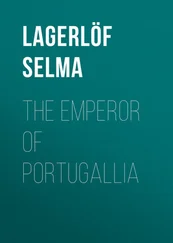“A seven-fold death awaits these travelers,” thought the palm. “The lions will devour them, thirst will parch them, the sand-storm will bury them, robbers will trap them, sunstroke will blight them, and fear will destroy them.”
And the palm tried to think of something else. The fate of these people made it sad at heart.
But on the whole desert plain, which lay spread out beneath the palm, there was nothing which it had not known and looked upon these thousand years. Nothing in particular could arrest its attention. Again it had to think of the two wanderers.
“By the drought and the storm!” said the palm, calling upon Life’s most dangerous enemies. “What is that that the woman carries on her arm? I believe these fools also bring a little child with them!”
The palm, who was far-sighted—as the old usually are,—actually saw aright. The woman bore on her arm a child, that leaned against her shoulder and slept.
“The child hasn’t even sufficient clothing on,” said the palm. “I see that the mother has tucked up her skirt and thrown it over the child. She must have snatched him from his bed in great haste and rushed off with him. I understand now: these people are runaways.
“But they are fools, nevertheless,” continued the palm. “Unless an angel protects them, they would have done better to have let their enemies do their worst, than to venture into this wilderness.
“I can imagine how the whole thing came about. The man stood at his work; the child slept in his crib; the woman had gone out to fetch water. When she was a few steps from the door, she saw enemies coming. She rushed back to the house, snatched up her child, and fled.
“Since then, they have been fleeing for several days. It is very certain that they have not rested a moment. Yes, everything has happened in this way, but still I say that unless an angel protects them——
“They are so frightened that, as yet, they feel neither fatigue nor suffering. But I see their thirst by the strange gleam in their eyes. Surely I ought to know a thirsty person’s face!”
And when the palm began to think of thirst, a shudder passed through its tall trunk, and the long leaves’ numberless lobes rolled up, as though they had been held over a fire.
“Were I a human being,” it said, “I should never venture into the desert. He is pretty brave who dares come here without having roots that reach down to the never-dying water veins. Here it can be dangerous even for palms; yea, even for a palm such as I.
“If I could counsel them, I should beg them to turn back. Their enemies could never be as cruel toward them as the desert. Perhaps they think it is easy to live in the desert! But I know that, now and then, even I have found it hard to keep alive. I recollect one time in my youth when a hurricane threw a whole mountain of sand over me. I came near choking. If I could have died that would have been my last moment.”
The palm continued to think aloud, as the aged and solitary habitually do.
“I hear a wondrously beautiful melody rush through my leaves,” it said. “All the lobes on my leaves are quivering. I know not what it is that takes possession of me at the sight of these poor strangers. But this unfortunate woman is so beautiful! She carries me back, in memory, to the most wonderful thing that I ever experienced.”
And while the leaves continued to move in a soft melody, the palm was reminded how once, very long ago, two illustrious personages had visited the oasis. They were the Queen of Sheba and Solomon the Wise. The beautiful Queen was to return to her own country; the King had accompanied her on the journey, and now they were going to part. “In remembrance of this hour,” said the Queen then, “I now plant a date seed in the earth, and I wish that from it shall spring a palm which shall grow and live until a King shall arise in Judea, greater than Solomon.” And when she had said this, she planted the seed in the earth and watered it with her tears.
“How does it happen that I am thinking of this just to-day?” said the palm. “Can this woman be so beautiful that she reminds me of the most glorious of queens, of her by whose word I have lived and flourished until this day?
“I hear my leaves rustle louder and louder,” said the palm, “and it sounds as melancholy as a dirge. It is as though they prophesied that some one would soon leave this life. It is well to know that it does not apply to me, since I can not die.”
The palm assumed that the death-rustle in its leaves must apply to the two lone wanderers. It is certain that they too believed that their last hour was nearing. One saw it from their expression as they walked past the skeleton of a camel which lay in their path. One saw it from the glances they cast back at a pair of passing vultures. It couldn’t be otherwise; they must perish!
They had caught sight of the palm and oasis and hastened thither to find water. But when they arrived at last, they collapsed from despair, for the well was dry. The woman, worn out, laid the child down and seated herself beside the well-curb, and wept. The man flung himself down beside her and beat upon the dry earth with his fists. The palm heard how they talked with each other about their inevitable death. It also gleaned from their conversation that King Herod had ordered the slaughter of all male children from two to three years old, because he feared that the long-looked-for King of the Jews had been born.
“It rustles louder and louder in my leaves,” said the palm. “These poor fugitives will soon see their last moment.”
It perceived also that they dreaded the desert. The man said it would have been better if they had stayed at home and fought with the soldiers, than to fly hither. He said that they would have met an easier death.
“God will help us,” said the woman.
“We are alone among beasts of prey and serpents,” said the man. “We have no food and no water. How should God be able to help us?” In despair he rent his garments and pressed his face against the dry earth. He was hopeless—like a man with a death-wound in his heart.
The woman sat erect, with her hands clasped over her knees. But the looks she cast towards the desert spoke of a hopelessness beyond bounds.
The palm heard the melancholy rustle in its leaves growing louder and louder. The woman must have heard it also, for she turned her gaze upward toward the palm-crown. And instantly she involuntarily raised her arms.
“Oh, dates, dates!” she cried. There was such intense agony in her voice that the old palm wished itself no taller than a broom and that the dates were as easy to reach as the buds on a brier bush. It probably knew that its crown was full of date clusters, but how should a human being reach such a height?
The man had already seen how beyond all reach the date clusters hung. He did not even raise his head. He begged his wife not to long for the impossible.
But the child, who had toddled about by himself and played with sticks and straws, had heard the mother’s outcry.
Of course the little one could not imagine that his mother should not get everything she wished for. The instant she said dates, he began to stare at the tree. He pondered and pondered how he should bring down the dates. His forehead was almost drawn into wrinkles under the golden curls. At last a smile stole over his face. He had found the way. He went up to the palm and stroked it with his little hand, and said, in a sweet, childish voice:
“Palm, bend thee! Palm, bend thee!”
But what was that, what was that? The palm leaves rustled as if a hurricane had passed through them, and up and down the long trunk traveled shudder upon shudder. And the tree felt that the little one was its superior. It could not resist him.
Читать дальше












